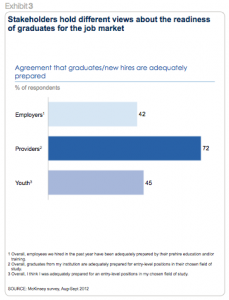It’s not exactly a meme, but recently, Conor McNulty posted a request for advice, thoughts, feedback, etc. to Acronym. Topic: what would you have done differently in your association career?
KiKi L’Italien then picked it up as the topic for a recent #assnchat.
I figured I’d add my two cents.
Looking back on your time in associations to date, what would you you have done differently to better your effectiveness? Your career?
I would’ve chosen a different mentor. The person I initially hooked up with was working for an association at the time and knew a lot about the field I’d studied in grad school, but her allegiance was to the field, not to association management. I learned a lot of my work people skills from her, but she really wasn’t able to guide me in association management per se. Pretty much had to do that for myself (I know – I’m such a Gen-Xer!).
I would’ve attended IOM. By the time I even found about it, it was kind of too late. I was post-CAE and had just changed jobs. My new ED had an IOM certificate on his wall. I asked him about it, and he said good things, but also said that since I already had my CAE, it probably wouldn’t be worth the time investment at that point. I think it would’ve been a good experience if I’d hit it at the right point in my career.
I would’ve gotten more involved with ASAE sooner. I joined, at the recommendation of my first ED, pretty much as soon as I started working in associations (1997), but I didn’t really start getting involved until after I earned my CAE in 2004. That’s a lot of wasted time.
There’s one job I wouldn’t have taken. I got dazzled by the flash and didn’t ask enough or the right questions, and it resulted in one of the most unpleasant periods of my life. But I suspect we all have at least one of those.
What do you see as a common, yet avoidable mistake for young professionals?
Don’t just chase the money. Strange thing to say in associations, I know, but even in our world, it is possible. And it’s SO tempting, particularly when you’re on the lower end of the association pay scale and you have school debt and want to buy a car, get rid of the roommates, get married, etc. and even a few extra thousand dollars would make a HUGE difference. That’s not to say don’t change jobs – definitely change jobs, but be sure that it’s about opportunity, getting you closer to your career goals, fit, broadening experience…AND more money.
Make friends and contacts of ALL ages. It’s really easy to surround yourself, at least primarily, with people who are in similar career/life stages. But reaching out to and regularly interacting with people both older/more senior and younger/less senior than you really broadens your perspective.
Keep your cool, women especially. This is still enough of a man’s world that if a woman gets visibly upset in the office, it’s bad for our career prospects – we’re “too emotional” or “irrational” or “can’t handle tough situations.” Which is all BS, and men get upset all the time, too, and aren’t punished for it, so it’s doubly unfair. But you have to be able to stay calm, at least on the outside, even if you’re sad or angry or stressed or scared or overwhelmed. Go for a walk and call your mom or your best friend or your significant other or your shrink, but do NOT lose it in front of your colleagues, no matter what. And NEVER cry in the office. NEVER.
What tools have you found to be most beneficial for your work?
It’s not a tool – it’s a technique. When somebody hits you up with a request for a favor in a professional context, ALWAYS try to help them out, or connect them to someone who can. Call it good karma, or ninja-level networking, or spreading the love, or paying it forward, or whatever, but people remember that you tried to help them and that you know people. Someday, you’ll need help, and if you’re known as a person who tries to connect people with solutions to their problems, you won’t even have to call in chips – people will line up to help you.
I’m going to add a final question I think is also important: “What would you absolutely, positively do again?”
Study what I wanted to for my grad degree, rather than forcing myself through the drudgery of an MBA.
Take the opportunity to attend Future Leaders when it was presented in 2004.
Earn my CAE.
